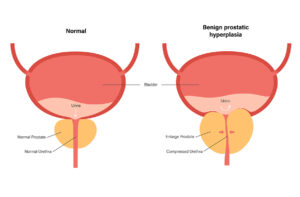This is a review how aging can affect your bladder function. When we age there can be changes of body functions like getting wrinkles in the face. We may also walk slower, have weaker muscles and start getting joint pains as a few other examples.
But it is also possible to get changes in bladder function. You may have to go to the bathroom more often to urinate and you may not empty as well as in the past.
Urinary tract infections (UTIs)
UTIs are common in women; 50% get one in a lifetime. In men it is only 10% who experience it in their lifetime. How do you know whether you have a UTI? If there is burning when you pee you should see your doctor for urine tests and cultures. Other symptoms are peeing more often and producing dark or bloody urine with a strange odor. You may have a fever and get pains in your back or abdomen. The infection can originate in your kidneys, ureters, bladder or urethra. Your doctor will do tests to figure this out and treat this condition.
Blockage in the urethra
In both sexes a blockage of the urethra can develop just underneath the bladder. Typically, this occurs later in life.
Prostate enlargement in older men
In men it is often an enlarged prostate gland that puts pressure onto the urethra just underneath the bladder. The doctor can prescribe pills for the prostate to shrink it (such as Dutasteride). This opens up the constricted urethra and the urine flow normalizes again. In the past urologists performed a transurethral prostate resection (TUPR). However, often there were complications with leakage of the bladder or scarring after the procedure.
Bladder can prolapse in women
Childbirth is the most common reason why women can develop a bladder prolapse. Physicians call this a cystocele. The lower grades may be asymptomatic. But cystoceles become more symptomatic later in life, typically after menopause. It is then that estrogen is missing and the muscles that held up the prolapse are getting weaker. There are 4 grades of cystoceles, mild, moderate, severe and complete. It is the severe and complete cystocele that a gynecologist may have to repair. With the more severe forms of a cystocele the urethra can be kinked making it difficult for the woman to pass urine. When urine backs up into the bladder and the kidneys, the kidneys can undergo a transformation, called pyelonephritis. This is a chronic kidney disease.
Bladder stones
A bladder stone can come from kidney stones that migrated into the bladder or they may have originated from the bladder itself. Stones are more common as we age. Smaller stones may pass spontaneously. A urologist can remove midsize stones while doing a cystoscopy. This is a minor procedure where the urologist passes a small fiber optic tube into the bladder. He grabs a mid-sized stone and removes it that way. If a bladder stone is larger, ultrasound shock waves from a lithotripsy instrument can break a larger stone into sand-like fragments, which pass spontaneously.
Bladder cancer
Bladder cancer is the sixth most common cancer in the US. It gets more frequent as we age. Men’s risk to get bladder cancer is 3.3-fold higher than females. In their lifetime men have a chance of 1 in 26 to get bladder cancer, women only 1 in 86. 90% of patients diagnosed are above the age of 55. The peak of diagnosis is at age 73, so bladder cancer is a disease of the aged. Symptoms of bladder cancer are blood in the urine, having to bear down to empty your bladder, painful urination and lower back pain. See your physician right away for tests and treatments.
Conclusion
When we get older the bladder can give us troubles. Urinary infections are more common and blockages can develop in the urethra. In the male a blockage could come from an enlarged prostate gland. In women it is from the late complications of childbirth. You may need a specialist to sort this out. In a man a simple pill, Dutasteride can solve the problem of the enlarged prostate gland. In a woman a severe or complete cystocele may have to be fixed surgically by a gynecologist. With age stones in the bladder are more common.
A urologist can help get rid of bladder stones
They require attention by a urologist who will either do a cystoscopy or use ultrasound shock waves from a lithotripsy instrument that can break a larger stone into small sand-like fragments. Aging can affect your bladder function. 90% of patients diagnosed with bladder cancer are above the age of 55. The peak of this cancer is at age 73. Fortunately, many bladder cancers are diagnosed early because there is blood in the urine. Once this diagnosis is established and treatment is done, regular follow-up visits with the urologist are needed. This sums up the most frequently encountered problems with your bladder as you age.







